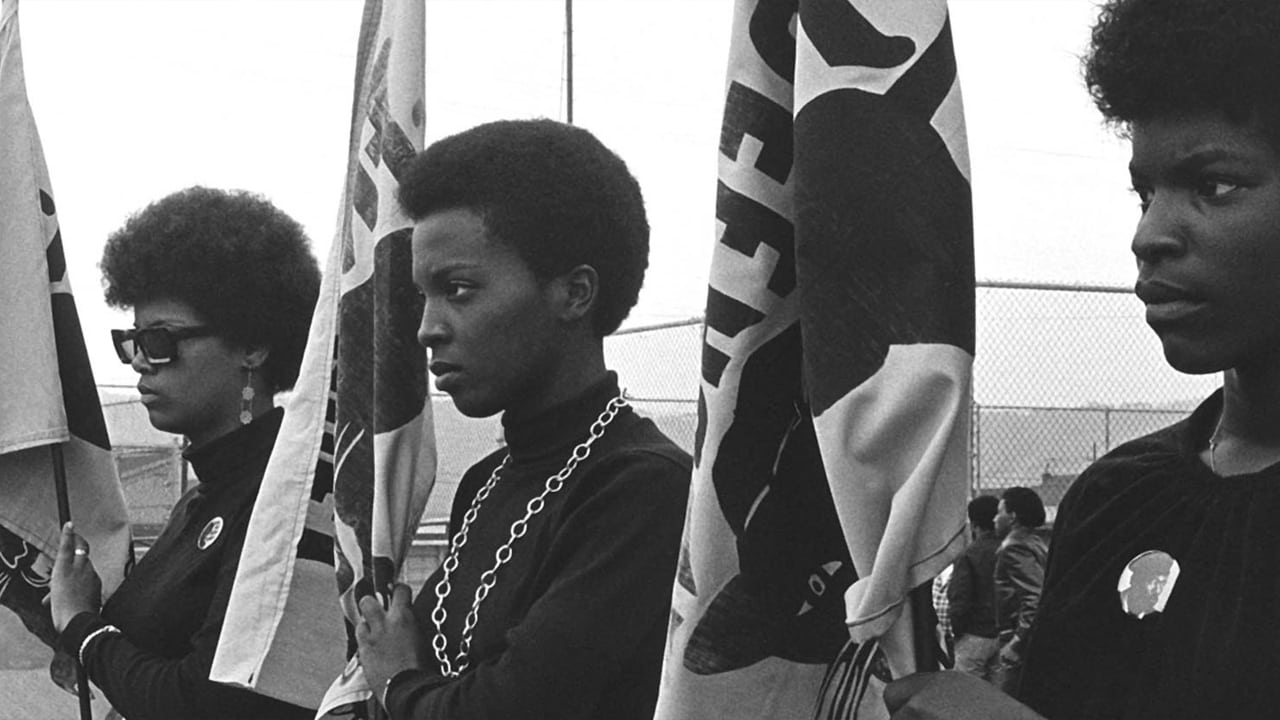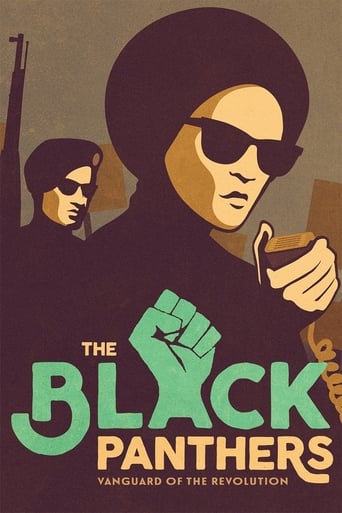

This is a heroic attempt at a one-film history of the Panthers. It suffers only from its own ambition- this is too complex a subject to offer a "history of" in the length of a single feature film. The best parts of the film are the stirring, emotional recounts of battles with agents of the state by revolutionaries who were on the front lines, heroes most of us have never before heard of. The portraits offered of the iconic Party leaders were a bit more problematic, or simply lacking. The presentation of Huey Newton is far too simplistic. One comes away with a sketch of a sociopath who the Party naively turned into an icon. While there is credible documentation of Newton's erratic behavior and drug abuse after spending many years in prison on likely trumped up charges, watching this film you would not know of Newton's extensive and influential writings on revolutionary theory, including his ground-breaking advocacy of the Gay- Equality struggle. Other important strands of Panther history were simply lacking. There is, for instance, no mention of George Jackson or the Angola Three. Still, a fine attempt to do a lot with too little space and time.
... View MoreThis is the story of the revolutionary group, The Black Panthers. Formed in the late 60's, they were an anti-capitalist, left wing militant group formed by disenfranchised black citizens originally in Oakland, California. Their formation was a result of the continued harassment and police brutality their people suffered in American cities at that time. It was a separate incarnation from the Civil Rights movement which had been specifically about redressing the actual lack of equal rights for black people in the American southern states. The Black Panthers were formed to stand up for blacks in the more 'equal' urban areas who were still put upon by the white authorities and who still suffered much racism. They famously had an image of openly bearing arms and their overall approach was of a more confrontational style than that preached by Martin Luther King. Just as important, their look became very chic, dressed all in black, wearing berets, leather jackets and shades, they also sported afro haircuts in an unashamed way for the first time in contemporary America. The idea was to visually show that black was beautiful in its natural form. The look certainly resonated with images of the group making the front covers of various magazines; it remains iconic to this day.The film is made up by a combination of extensive archive footage from the time and current interviews with past members of the group. It tries to understand some of the motivations and ambitions of the group, while looking at some of their opponents such as the head of the FBI, J. Edgar Hoover who seemed quite obsessed with eradicating the group. In one telling clip he even states that he doesn't consider the concept of justice as being all that important and that law and order was what he was all about. So it's perhaps not so surprising that this philosophy led to an infamous incident where a prominent member of the Black Panthers was murdered by the Chicago police, an event that is thought to be related to the FBI chief in some way. For some reason though, despite the very interesting subject matter and the dramatic backdrop that the late 60's / early 70's America provides, I felt something lacked from this telling of the story. It never seemed to be as dynamic as it should be and while I learned a few things, it never felt as engaging as it should be and so I left a bit disappointed on the whole. This is certainly an interesting subject though and it does cover quite a lot of ground but I felt it could have been more dynamically told.
... View More*May contain spoilers, but not really* The first thing that struck me about this film was the absence of talk about revolutionary theory or even tactical practice. With a name like it has one might think it would unpack the nuanced and much debated term "vanguard" a little more. The influence of Mao Tse Tung thought is completely absent apart from a sign that says "Chairman Mao says: Free Huey," which is never explained or even mentioned. Primarily the film tells the story of what happened, but does not explore motivations, expectations, hopes, dreams or rationale any more than is necessary for a cursory tally of events.However, it is actually an entertaining film for precisely that reason. There are guns, there is action, there is insanity; or more properly put, allegations of insanity. Actually, the film is pretty sensationalistic. If you're a radical interested in an analysis of the BPP this is not the place to look. I get the sense that the interviews in the film are brutally chopped up.My favorite part of the film was also my favorite part of BPP history and that is Fred Hampton's work in Chicago and his resulting assassination by agents of the state. The film actually does make a pretty good case for why Hoover's FBI, the Nixon administration and the cops in Chicago considered him dangerous. However, one of the strongest arguments for his perceived danger from the state (and I do think it was justified) is the eloquence of his speeches and clips of these speeches are sadly lacking. One my favorite speeches is the one where he says: We've got to face the fact that some people say you fight fire best with fire, but we say you put fire out best with water. We say you don't fight racism with racism. We're gonna fight racism with solidarity. We say you don't fight capitalism with no black capitalism; you fight capitalism with socialism.We ain't gonna fight no reactionary pigs who run up and down the street being reactionary; we're gonna organize and dedicate ourselves to revolutionary political power and teach ourselves the specific needs of resisting the power structure, arm ourselves, and we're gonna fight reactionary pigs with INTERNATIONAL PROLETARIAN REVOLUTION. That's what it has to be. The people have to have the power: it belongs to the people.In the film this speech was cut off after the first two sentences.Additionally, the film focused solely on what was going on with the Panthers at the time and completely obfuscated the context of the time. It made mention of white allies but it did not talk at all about the Weather Underground, for example, who issued a "Declaration of War" against the US government in response to the assassination of Hampton and subsequently bombed multiple government buildings.Like I said, this is an entertaining movie and some parts are even inspiring, but if you're looking for the definitive story of the Black Panther Party, this is not the place.
... View MoreWhen was the last time a state legislature infringed on the right guaranteeing a citizen's right to openly carrying a gun? Well, Stanley Nelson's excellent documentary The Black Panthers answers that question. Imagine then governor Ronald Reagan and the conservatives in the California legislature, won over temporarily, to the idea of gun control by the sight of the Black Panther Party marching into the statehouse in Sacramento, carrying loaded shotguns and rifle, as state law and the Constitution allowed. Challenging political order and mayhem, who were this new breed of "Negroes," dressed from head to foot in black? Why did they did they project an image of militancy and armed purpose? Today's headline grabbing evidence of police brutality and racial injustice to black people have not spawned the same response that gave birth to the BPP in response to oppression and marginalization, as #-tag Black Lives matter. Why? Nelson has recovered through use of newsreel, take, take outs from Eye on the Prize and interviews with aging ex-Panthers, to dust off 50 years of ignorance. We are transported to another galaxy of time. It was an age of war and revolution. Algeria, Cuba, Vietnam. It was also an age of turmoil that broke the back of colonial domination and smashed in the chains of vote denial in the American South, albeit through non-violence, as Ava DuVernay's striking film Selma serves as clear evidence. But what worked in the South couldn't and wouldn't in the North because voting rights were not the issue. Racial injustice and the ever-present violence and brutality of the police were. (Chester Himes' "Coffin Ed and Grave Digger Jones" mysteries, recreate life in urban ghettos.) The Black Panthers gives body to the logic of a society that marginalized and trivialized and isolated a third of its citizens through naked violence. And, as such, it birthed the BPP in Oakland, California in 1966. The choice of the symbol of the Black Panther is significant. In Mayan culture, the animal, a fierce fighter, is a totem of aggressiveness and power. It does roar. It won't strike unless provoked. The outbreak of the Panthers on the scene was merely an acceleration of a process of political awakening that had been building for some time at home and abroad. Stokley Carmichael had called for Black Power in the heart of Mississippi. And James Baldwin's 1963 The Fire Next Time, according to the Negro Spiritual, promised a conflagration as the wide range of injustices morphed into a call for political action. Furthermore, the BPP saw itself in the vanguard of sweeping change. To exploit the fever of heated times, it harnessed revolutionary gestures and emotions. So, six young men began organizing activists to confront the local police with guns. They spurned the appeal of Nation of Islam that preached self-segregation. They also rejected the belief that society could be made better by the change of the human heart. The zeitgeist of revolution had taken hold. If the US was fighting for "democracy and freedom and liberation from Communism" in Vietnam, the BPP figured that they were going to protect and fight for the interests of their own people that Washington sorely neglected. So, they took up the gun; they didn't confront the police but stayed at a respectful distance, to see that blacks weren't abused. Like their namesake, they remained vigilant unless otherwise provoked. The adoption of the powerful image of a gun had a revolutionary source: after all Mao did affirm "power grows out of the barrel of a gun?" The Party had an all-embracing slogan Power to the People. It had an ideology--and a 10-point program What We Want Now! It had a newspaper; it had revolutionary art; it had a "military force," and above all, it had what Carlyle called: beginners, men who had qualities to serve its ideas and ideals in the persons of Bobby Seale, Hotspur-like Huey P. Newton, and Eldridge Cleaver. Government repression and internal backstabbing over who upheld the purity of the BPP helped destroy the party is this gripping film.
... View More